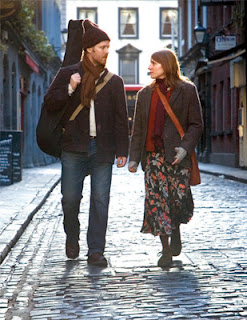Once
 Once is a charming, scruffy movie that is a sure cure for the blues. The tale told is written, acted and sung in such winning manner that a viewer can be easily transported. And though Once is a romance, it is not the kind of sickly-sweet drivel that Hollywood would churn out with Drew Barrymore in the lead.
Once is a charming, scruffy movie that is a sure cure for the blues. The tale told is written, acted and sung in such winning manner that a viewer can be easily transported. And though Once is a romance, it is not the kind of sickly-sweet drivel that Hollywood would churn out with Drew Barrymore in the lead.The setting is Dublin, and our protagonists are a street musician, played by Glenn Hansard, and a Czech immigrant, Marketa Inglova. One night Hansard is playing his own stuff (he plays cover songs during the day, because that's what people want to hear). No one is listening, except for a demure young woman with an accent. She is drawn to his music, and attaches herself to him. When she finds out he works in a vacuum-cleaner repair shop, she shows up the next day with a broken Hoover.
She is also a musician, and frequently stops by a music store to use their pianos (she can't afford one of her own). She brings Hansard along and he teaches her one of his songs, and the result is one of the most engaging musical numbers I've seen in a film in a long time. You can take all the razzle-dazzle of Dreamgirls, this scene, with two people, two instruments, and a Dublin music store, is what movie musicals should be all about.
As the story progresses, we learn that Hansard (we never learn the characters' names) pines for a woman who moved to London, and Irglova has attachments of her own. But instead of being about whether the characters will ever hook up, it becomes about something more interesting--that these two supply something that the other needs. Irglova has inspired Hansard to finally do a demo of his music, and the two of them, along with some musician friends, borrow some money and rent a recording studio for an all night recording session.
Though this isn't a true musical--the songs are not part of the narrative--there is plenty of music, and if the songs weren't any good this film would be dead in the water. Fortunately the songs, written by Hansard, who is the lead singer of a band called The Frames (and was also a cast member of The Commitments, the other great Irish movie musical) are wonderful. They're hard to classify in genre terms, suffice it to say that they emo with a gritty edge.
The film is written and directed by John Carney. It was filmed on a low budget and shows, but even with limitations there are some wonderful uses of the camera. A for instance: Hansard has given Irglova a copy of a song he has written but has no lyrics, so he invites her to write some. She has to run out to get batteries for the CD player so she can keep listening to the song, and as she walks back to her apartment from the store, in her pajamas and bunny slippers, she sings her newly created song, and the camera records it all in one long take.
In a summer of mega-blockbusters, it's nice to have the option to see a much smaller, more intimate, more human film like Once.


Comments
Post a Comment